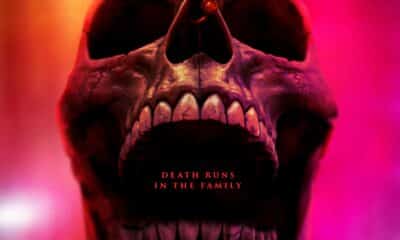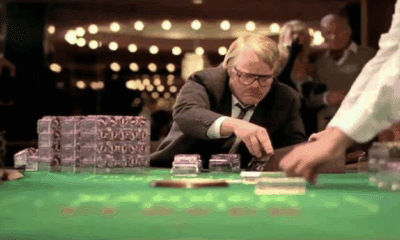Cinemas are once again open in the UK, and thanks to a bottle-neck of films and a forever changing release schedule, horror fans are in the exciting position of getting not one tent-pole genre film, but three, all in the space of a couple of weeks. UK cinemas reopened on the 17th May with the latest Saw movie Spiral, then on the 4th June we get the much anticipated A Quiet Place II. Before that though, and making the very delicious filling in a devilish sandwich, comes the third instalment of the The Conjuring movies.
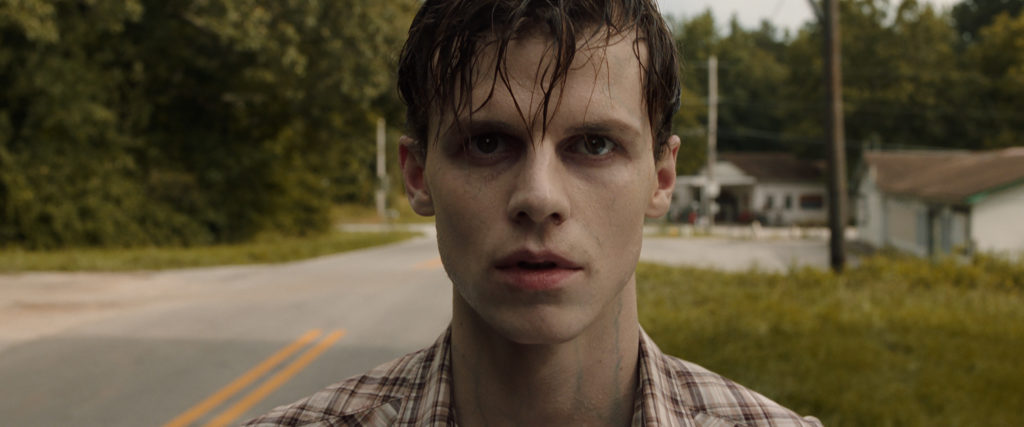
In The Conjuring: The Devil Made Me Do It there’s a shift from the seventies to the eighties, as well as from the haunted house setting to more of an investigative procedural as the Warrens (played once more by Vera Farmiga and Patrick Wilson) set out to help a young man, Arne Johnson (Ruairi O’Connor). The story is based upon the real-life case involving Arne Johnson, which is infamous for being the first US trial where the defendant pleaded not guilty due to supposedly having been possessed at the time of the murders.
Ahead of the film’s release, we were fortunate to get an invite to the virtual world press conference. In attendance were stars Vera Farmiga, Patrick Wilson and Ruairi O’Connor as well as producers James Wan and Peter Safran and director Michael Chaves. Some of the highlights of the event can be found below.
James and Patrick, when did you realise that Michael [Chaves] was the right person to tell this story?
JAMES WAN: Michael and I had worked together on The Curse of La Llorona and so I saw Michael was filmmaking on that film, and I saw how much he grew through the course of that film. The other really important thing for myself is, we wanted to make it someone that would respect what Peter [Safran], Patrick [Wilson], Vera [Farmiga] and myself did in the first film. We wanted a filmmaker that has a vision to take it in a new direction, but yet really respect the world that we had created.
PATRICK WILSON: I think that’s spot-on. It’s a tough requirement because you want someone to have their own vision and put their own stamp on it, but in a selfless act. Meaning, you don’t want a director to come in there and say, “I’m going to do it so differently because it needs to be different. I want to be different”. That’s not how Michael operates. Because of the way this story is so different, and it really lends itself to more of a thriller aspect, with of course the horror being the overwhelming theme, but it took it into a new place. So of course to have a new director and a new vision I think helped it.
Obviously, this was born from James years ago, of James having this idea and this story. We knew it was coming, the Arne Johnson case, even before Chaves was brought on, but Chaves was such an amazing fit. Not only did he have this technical prowess, but honestly, and this should not be taken lightly, the positivity that comes from this guy and from James in their filmmaking is something that we all respond to as actors. We need a group that is working towards the same goal, but honestly, because it all gets so dark in these films, you want someone that is going to lean into the love. Because love wins in these movies. As dark as this film gets, there’s a whole other lightness to it that Chaves brought.
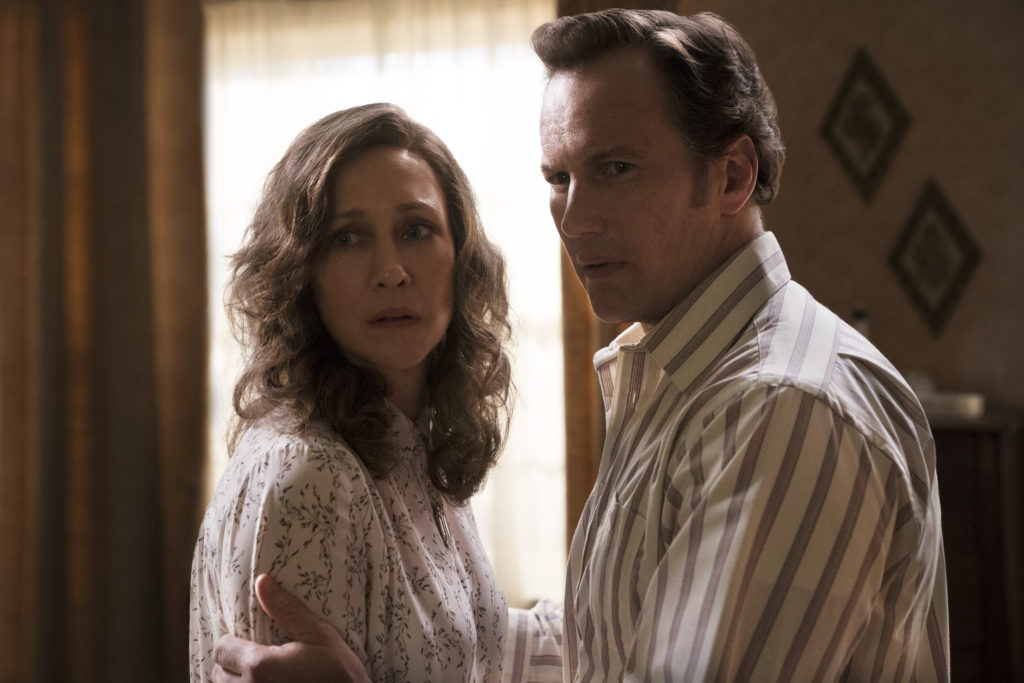
Despite all the strange goings-on, Ed and Lorraine Warren always remain the heart of The Conjuring movies. What do you think it is about the couple that people find so fascinating?
VERA FARMIGA: I know what I find fascinating is that they are the personification of love. I think it is a love story. For me, it is more of a love story than it is a horror story. That’s what makes it so unique and successful, and that’s why I enjoy coming back. I think that message of love, not only the Warrens for each other, but for the work that they do, and for the people that they help, that selflessness, that compassion, that embodiment of love is really, really something, holy and special, that makes it digestible and beautiful.
Patrick: I always have to go back to the conversations James and I had early on about how the structure of these films was going to be built – following these different cases and these different families, but really centred around the Warrens, and they become the through-line between all these films. That’s something that (1) sets us apart from other horror franchises, is that you’re following the good guys throughout instead of the villain, but (2) the fact that you knew you’d get to the scare, but you knew you had to build the character and their relationships. Whether it was guy and a guy, a guy and a girl, whatever it was going to be. So we already were leaning into character and relationship, in love and partnership in these movies. When you have that, when you can centre around love… and it’s our version of Ed and Lorraine, we don’t know how they were behind closed doors. It’s our version of what Ed and Lorraine are. When you can centre around that, then I think in some way it frees you up to go as dark as you want in the other aspects, because you really get to balance it out. I would say that this film probably has some of the darkest moments of any in the universe, but like you had with the Elvis moment in the second one, or us dancing at the end of the second one, you have those moments in this, of just deep profound romance. We don’t go halfway with either. If you’re going to have these terrifying scares then we want to have the most full of love moments that you can because it does become very operatic.
Ruairi, you had to play a possessed person. Did you use a character from another possession movie as a reference to know how to contort your body or how to scream?
RUAIRI O’CONNOR: I mean, it was a huge challenge for me because I’m very scientifically minded and very cynical. I remember talking to Vera on set a lot and she has this really kind of warm openness to there maybe being some kind of paranormal or something Beyond. She’s just kind of playful with it and we’ll be talking about little spooky things that happened throughout the filming of The Conjuring, and the other films as well, and I was just wishing that I would get some kind of spooky event that would just like bed me into it. But unfortunately, it didn’t, so I worked with my acting coach a lot to dredge up personal demons and stuff. Like dying of an illness and that kind of thing to really rail against and ground it.

Was there any apprehension about moving into the 1980’s. Since this decade has kind of become a cornerstone for movies in TV, in the past, and movies in the past five years, and what challenges did this bring to the storytelling?
JW: It felt like the natural progression, because we had spent a lot of time in the 70’s. Ed and Lorraine Warren, their case’s and their careers went from the 60’s, 70’s, 80’s and into the 90’s. It just felt like the natural progression for us to kind of move, and aesthetically it just felt like it was the right thing to do. We’ve exhausted the 70’s look, and the 80’s was the natural way to go. It was naturally where the story and the characters, and just a period of the story of where it wanted to take us.
PETER SAFRAN: We’re also driven by the real-life case. We try to figure out the story that we want to tell, and then set it in the appropriate era. We don’t, in our films, hit it on the head, what the era is like; the movies that we did, they were set in the 70s, it wasn’t the Disco 70s. So the change for Ed and Lorraine between the 70s and 80s is not so dramatic for us. For us, it really was just about being true to the story.
MICHAEL CHAVES: Yeah, it is just based on the real-life case, and it took place in 1981. The idea of going into a new decade is almost like you’re turning a page into a new chapter, and a new chapter in the careers of the Warrens. We’re kind of opening new doors in the franchise of The Conjuring and just exploring different things. Lorraine during the 80’s would work with detectives and police departments. I mean, that was something that we haven’t been able to explore before. It was a time that people forget, but there were actually a lot of psychics and clairvoyants working with police departments, so much so that the Department of Justice actually issued a handbook in 1989 because so many departments were working with psychics. They were like, we need to actually formalise some kind of working rules of working with psychics. The other thing in the 80’s is that this is the dawn of the Satanic Panic. I think there were a lot of cool textural things that it plays as a backdrop in this movie, and it’s kind of fodder for something that could be explored in future cases.
Did the shooting leave room for improv in horror sequences, did the production hide certain effects in order to obtain frank reactions from the cast?
VF: Where I find the most room in Conjuring, is in between the lines, the stuff that’s unspoken. I also can tell you that this is some of the biggest stuff I’ve ever had to play in my career, like operatic, like it’s epic. The emotional scope of this character, I mean I’ve never had to consider a character’s spiritual prowess. When you’re denouncing demons, this stuff is huge, and I don’t necessarily rehearse it, there is so much improvisation that happens within these moments. I’m just kind of grasping at straws in these moments, and these bigger moments, these bigger emotional moments, like they simultaneously delight me and they scare the crap out of me, having to execute them with earnestness. There’s always room for improv, but I don’t think we actually ever veer off book too much. I think the scripts are always quite succinct, but I find that there is, within the framework of these scenes, and especially even in the way that they’ve written Ed and Lorraine, I think there’s so much room for nuance and adding nuance. And for me those moments are largely unspoken but yeah, sure.
ROC: From my point of view, I thought with Patrick and Vera, just seeing the other films, that there must be loads of moments that they’re probably improvising in because it’s so natural and sincere and their relationship. Then watching the film, and seeing all the scenes I wasn’t involved in I’m like, “that’s pretty much read exactly off the page”. it’s always scary having to deliver lines if they’re going to feel uncomfortable in your mouth or whatever, but they’ve managed to make that relationship real. From my own personal position on improv in this one, I agree with Vera that most of the improv takes place in the physical acting of what you’re going through.
PW: When you start being a theatre animal, and you’re used to having scripts where the writer has been dead for 500 years, you don’t think about changing lines. So there’s actually still a little bit of that in me. I also, with respect to Michael and James and Peter and David [Leslie Johnson-McGoldrick] who’s written these scripts, the last thing you want to do is like, “all right you guys have been doing this for a year and a half but I figured out something over the weekend that you’ve never thought about.” That rarely comes into play. Usually, it’s trying to figure out if you’re missing a moment like, “maybe I could say this like this. Oh that works.” Or a lot of times just little grammatical things, but I like to stick to the script because that gives me a fence to play in. Then like Vera and Ruairi said, everything else in between we can figure out. We can figure out blocking on the day, and all that kind of stuff, or actions to do, something to play against. But I like the script to be dead on.
Also just from a technical standpoint, it just gets a big mess if you start ad-libbing something in the wide, then you’re going to stick to it and it’s not great. So I always try to keep an ear out for if I’m changing something on purpose, I’ll usually tell the script supervisor, even before I tell the director, like, “hey, just so you know, I’m going to try this” so they know what’s going on. It’s not like a comedy where like, “let’s do 15 different takes of this joke and see what lands at a test screening”, this is incredibly technical. We do our work, then they take it, and then they’ve got to make it. Making a horror movie is so much more technical than a drama, and I say that as someone that hasn’t even directed one yet. But I know that from my years with these guys. It is so well thought out that it’s our job to think of things, overthink things, and make it look so effortless and easy and like they must have just come up with that on the day. Not true.
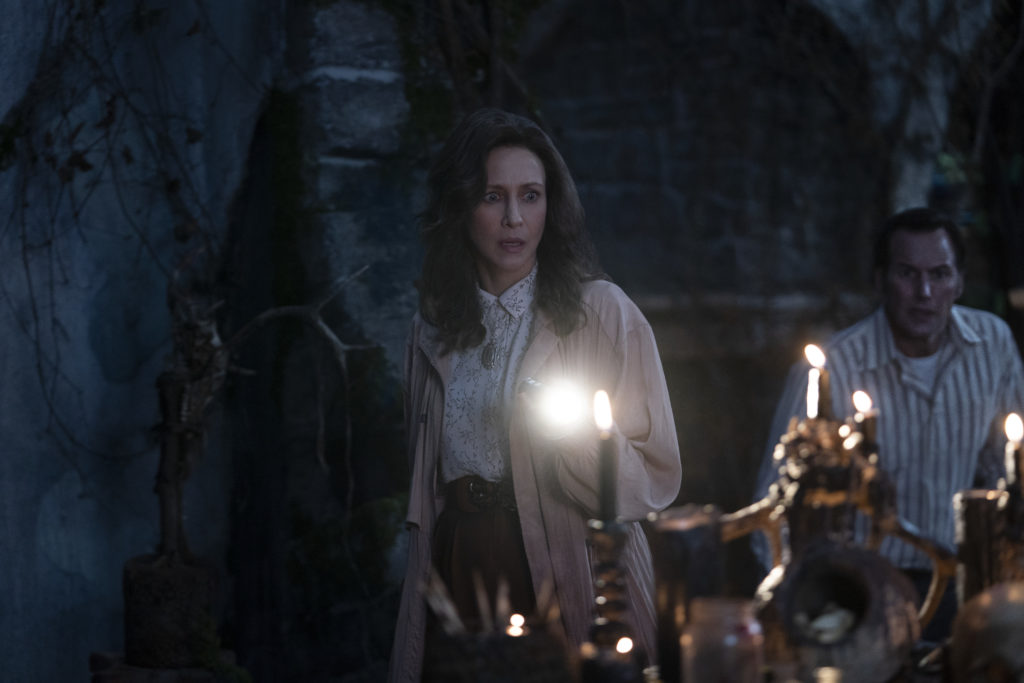
James, you have created two iconic horror film franchises. With probably more on the way. Is there a secret ingredient or something that you specifically look for when building a potential horror franchise?
JW: I don’t think there’s a secret ingredient. I think for me I just want to tell the stories I want to tell. I want to tell the stories I want to watch as an audience. If I have to put my finger on something, it’s telling stories with characters that people can relate to. I believe that’s why, whether it’s Insidious, or The Conjuring where we’re with Ed and Lorraine. It’s creating these characters that are really beloved that they’re real people. I mean definitely in the case of Ed and Lorraine, who are based on real people. The more grounded you can make it, the more the horror scenes or the kind of scares you put these characters into play more fearfully. I think that the most important piece of ingredient is to let the audience be able to be in the shoes of these characters. Then you can take them on the craziest scariest ride.
Why do you consider this the darkest movie of the trilogy?
PS: I think predominantly because it’s a true story that involves a murder. There’s a real victim in this case, that is not just a family being terrorized by something unholy. In this case there was a real murder, and a real victim, and I think inherently that makes this the darkest of the movies. And I think what Patrick referred to earlier – it almost requires the most love from Ed and Lorraine to counteract and to balance that real darkness that exists in the real Arne Johnson case. We were always very sensitive about the fact that there was a real victim. There were many victims, but there was really one murder victim in this. We were always very sensitive to it and I think that’s probably why it’s the darkest, but also has the most love in it.
These films are obviously dramatized versions of the Warren’s case files. Is there a North star for staying true to Ed and Lorraine and their work, while also delivering the frights and intensity that contemporary audiences expect?
PS: We’re making movies so we base them in the real case files and then we dramatise them as we see fit to make the best possible experience for the audience, to tell the best story. But it’s very important to us to stay true to, in particular, the relationship between Ed and Lorraine. So to make sure that it’s grounded in that love, and then in terms of the scare sequences, we can go to places that were not necessarily based in truth but are just great, original sequences that audiences are going to get excited by. We’ve never pulled back on a scare sequence because we said it didn’t fit within, you know, the fact pattern or what actually happened in the case, but we are always conscious of that relationship between Ed and Lorraine. So we make sure we would never write anything that Ed and Lorraine wouldn’t do.
MC: With these stories I try to just anchor it to what the emotional truth is. Our movie opens with this exorcism, we have a recording of it, that actually ends the movie, plays over the end credits. That recording is… maybe you’re totally a sceptic, maybe you don’t believe in demons or God or any of that. But you can’t listen to that tape and say that something powerful was not going on there. You can’t listen to it, and not connect to the emotion in that, connect to the real terror that that family was going through. I was raised Catholic, I’m always a sceptic, but always someone who wants to believe. And so I always go back and forth. James always talks about finding the emotion and really delivering the emotion.
I mean, I can say back to the exorcism there’s a lot of interviews on that. There were a lot of people describing David Glatzel as levitating off that table. That’s a very powerful image. That’s a very specific example of something that we actually changed. We’ve seen that a lot of times, we saw it in The Exorcist, it was something where we actually deviated because we wanted to do something that was more unnerving and something that we haven’t seen before. We weren’t fictionalising it, we just chose to kind of go into a different direction, because like Peter said, we’re making a movie.
JW: I think what works for The Conjuring films, at least for me, and I know it is for Michael as well, is start with something that is real. So like Michael was saying, he’s basing some of these scares off of reports that people have talked about. If you start with that, then you can embellish on it. But you always keep coming back to that point of that foundation, where it was grounded in reality to begin with. I think people can tell the difference between things that are based on “reality” quote, and something that is outlandishly made up.
How did the film’s procedural element, as opposed to the classic haunted house sub-genre, transform the nature of the horror that we see in this film?
MC: I think that what it did is, it just took the Warrens, we’ve seen them in two haunted house movies before, and I think that the great thing about a procedural is you are on the road. You’re going into different environments, you’re working with different people. It’s taking you outside of what really is a comfortable setting. At this point in their careers, and in our experience with the Warrens, the haunted house has become a comfortable setting. So I think it gives us an opportunity to take them into places that we haven’t seen. What I’m so excited about is there’s scenes, there’s sequences in the movie, that haven’t even been in the trailers, but everybody loves them when they see them, and it’s because it is so out of the experience of what we’re used to. I’m so excited, and I’m honestly so thrilled that they weren’t put in the trailer because there’s a lot of cool wild stuff in store.
Watch The Conjuring: The Devil Made Me Do It in cinemas from 28th May.
Kat Hughes is a UK born film critic and interviewer who has a passion for horror films. An editor for THN, Kat is also a Rotten Tomatoes Approved Critic. She has bylines with Dread Central, Arrow Video, Film Stories, and Certified Forgotten and has had essays published in home entertainment releases by Vinegar Syndrome, Arrow and Second Sight. When not writing about horror, Kat hosts micro podcast Movies with Mummy along with her six-year-old daughter.

Latest Posts
-
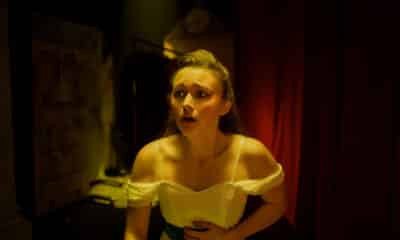

Film Reviews
/ 1 day ago‘Fear Street: Prom Queen’ review: Dir. Matt Palmer (2025)
It has been four years since Leigh Janiak’s Fear Street trilogy took horror fans...
By Kat Hughes -
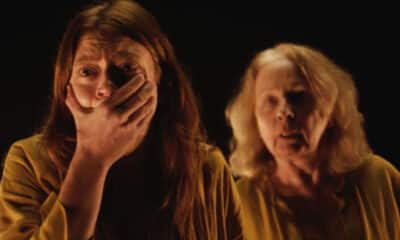

Film Reviews
/ 2 days ago‘The Surrender’ review: Dir. Julia Max (2025)
As Julia Max’s debut feature, The Surrender, unfolds, the inspirations for the film become...
By Kat Hughes -
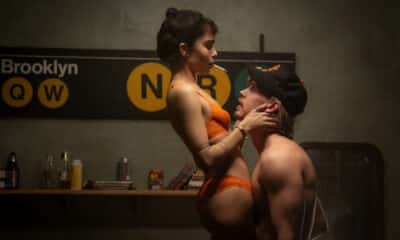

Film Trailers
/ 3 days agoFirst trailer for Darren Aronofsky’s ‘Caught Stealing’
Sony Pictures has released the debut trailer for Darren Aronofsky’s new film Caught Stealing,...
By Paul Heath -
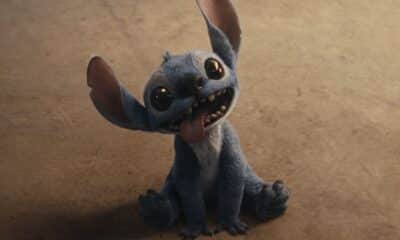

Film Reviews
/ 4 days ago‘Lilo and Stitch’ review: Dir. Dean Fleischer Camp (2025)
Director Dean Fleischer Camp won audiences over with the fantastic Marcel the Shell with...
By Kat Hughes
